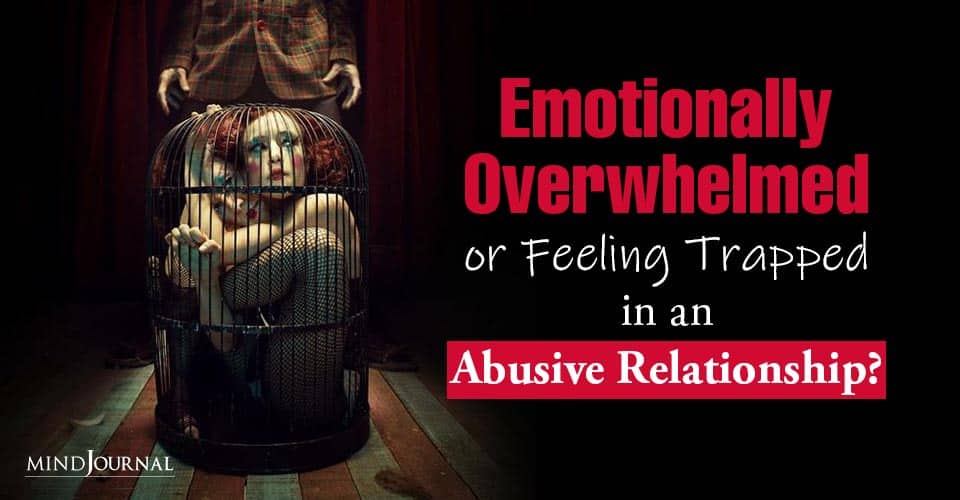When you are trapped in an abusive relationship, feeling emotionally overwhelmed and mentally exhausted are just two of the many negative emotions you go through. But, you cannot stay in a relationship like that forever, can you?
Emotionally overwhelmed.
Feeling trapped.
I was emotionally overwhelmed. Feeling trapped. Like there was no way out.
When I was in the final stages of an abusive relationship my self-esteem was shot. I was numb to my feelings. I wasn’t allowed to have anyway. His always took priority over mine.
I was a zombie, just trying to survive.
I feel trapped. Emotionally overwhelmed.
I kept thinking.
I miss the old me.
I thought.
How did I become this person?
I barely recognized myself anymore.
These are the words I hear from so many of you who write to me each day:
I want my power back
Yep. I know what that feels like.
I know your pain.
But don’t worry. It doesn’t have to be this way.
Codependency
Narcissistic relationships are codependent ones. This is how it works.
Narcissists have suffered deep childhood trauma. To cope with this pain, they create a False Self – an inflated sense of self and ego.
This False sense of Self-demands an insatiable need for validation and admiration. That comes from outside of themselves, external sources. As long as they get this they don’t have to face their true selves. So they look for the perfect supply.
And that’s us. Codependents. We are the right match.
Codependents like nothing better than rescuing others.
Helping them overcome the trauma of their past.
We put their needs and feelings above our own. We focus all our attention on them. We tell them how much we believe in them, even when we start to see the first signs they’re not good for us. Ignoring those red flags.
That is what a narcissist needs. Someone who’ll put them first. To feed off and make them feel good about themselves.
Related: 5 Big Life Questions Every Smart Woman Should Be Able To Answer
Narcissistic Abuse
The narcissist believes they have found what they need and start by being nice to us.
They love to bomb us and sweep us off our feet. The relationship will go on fast forward. They’ll push for commitment quickly and want us all to themselves.
This feels flattering at first, but it’s all part of their plan to isolate and control us. They need to protect their supply.
Narcissists can’t keep their mask up for too long. Particularly with those who get close to them.
When it slips we start to see the real them. That darker, abusive side.
Intimate relationships scare them. If we get too close to them we might see their true selves. The one their False Self guards and protects at all costs. This is way too painful for them, too close for comfort.
They need to push us away. Sabotage the relationship. That’s when they hurt us.
It’ll be emotional. Or physical violence.
But then after abusing us, they fear to lose us. Or more to the point, losing their supply.
They need to get that back, no matter what it takes. So they hoover us.
Hoovering
Their False Self goes back into action in full force. Saying how sorry they are, telling us they love us.
That wasn’t me.
That was my troubled past; because you said or did this; …. (insert anything here that is about them blaming someone or something else for their behavior, not them)
They need to gain back control. Make us dependent on them again. Need them, adore them, love them, feed their ego again.
If we ever question their bad behavior or abusive actions, they use insidious manipulative tactics. Like gaslighting.
They’ll lie to your face, even when they know you know they’re doing so. They’ll accuse you of doing exactly the abusive thing they’re doing. Claim they’re the victim, not you.
They’ll bring others in as back up. Allies they tell you to agree with them. You’re the crazy one.
If we ever have feelings. Get angry or upset over what they’ve done to us, they’ll flip it to deny them. Tell us we imagined it, exaggerate things or that we are too sensitive.
We are always to blame for them and their behavior. If not, they’d have to face the truth. It’s them. Their true selves. The one they’re running from and don’t ever want to have to face.
Repeat this cycle over and over. It’s no wonder we end up confused.
It’s more complicated than that.
Related: Self Liberation: How To Rewrite Your Toxic Life Stories
Codependents also have deep-seated insecurities.
A fear of abandonment. In some ways, we too have a troubled or at least, dysfunctional past.
We subconsciously feel someone who is damaged and needs us is unlikely to leave us.
When our abusive partner hurts us. Push us away. That fear is palpable.
We’ll do anything to get them back. Have them tell us they love us again.
Couple this with low self-esteem and abuse that’s diminishing it further.
We start to believe we are to blame.
It must be me.
We stay. We push all our feelings down and focus on theirs. We need to make them happy again. It’s up to us to fix things.
The trouble is a narcissist’s need for approval, admiration, and adoration is like an empty bucket. You will never fill that need.
All those years of trying to do this, in the hope you’ll fix the relationship. Get that loving person you believe is trapped inside the back. It’s killing you instead.
You’re left emotionally overwhelmed. Feeling trapped. Nothing you’ve tried has worked so far and now you’re spent. Wondering where the old you went.
That was me. I was a shell of myself.
The thought of leaving them is terrifying. Especially if there’s the complication of kids. But, the thought of enduring more of this pain and the rest of your life like this is gut-wrenching too.
No wonder you’re feeling trapped.
You need to try something else.
How about letting go? Stop trying to save them from themselves.
What about thinking about you for once? Where are you in all this? What about putting your needs first?
You are not his (or her) therapist. Their mother (or father). They are an adult capable of looking after themselves.
So, first things first. It’s time to take your focus away from them.
Look after you.
Stop wasting your energy, when it’s better used to heal you instead.
It’s time to take your power back.
If the fear of the future scares you. If big decisions about whether to leave them or not overwhelm you. Don’t think about that now. You don’t need to know all the answers just yet.
You just need to take the first baby steps to recovery and forging a healthier path.
First things first.
This is what they are.
Here Are 5 Steps That Can Help You To Recovery
1. Detach
Do your best to detach from them and their behavior. It’s not your fault or responsibility. Allow them to feel the consequences of their own actions. Instead of always picking up the pieces for them.
2. Put You First
Start by doing one nice thing for yourself every day. Whatever that is. A surf. A walk with your dog on the beach. A bubble bath. A guilt-free purchase of something that makes you feel good. One nice thing every day.
Related: How To Build Your Belief In Yourself
3. Join a Support Group
Join a support group in person or online. That was invaluable for me. Sharing and listening to others like me gave me a sense of relief. I wasn’t alone. Many were further down the track than I was. I learned from them too. Applying their experience and knowledge to my own situation. I did and it worked.
4. Get Professional Help
Seek professional help and support. You can’t do this alone. Get professional advice and practical help. Including financial or legal advice to know where you stand. I’ve listed domestic abuse helplines here.
5. Knowledge is Power
Read every self-help book you can get your hands on. Knowledge is power. This is what I did. Understanding narcissistic abuse and codependency gave me the tools I needed to break the cycle.
If you’re emotionally overwhelmed. Feeling trapped, focusing on you is the crucial first step. Getting support to build your self-esteem is the way to start getting your power back.
You don’t need to make big scary decisions like leaving your relationship right now.
When you need to know the answer to that, you’ll be strong enough to decide.
Are you emotionally overwhelmed? Feeling trapped? Do you want the old you back? Let me know in the comments below.
Written by Vivian McGrath
Originally appeared on Unbeatable.com











Leave a Reply